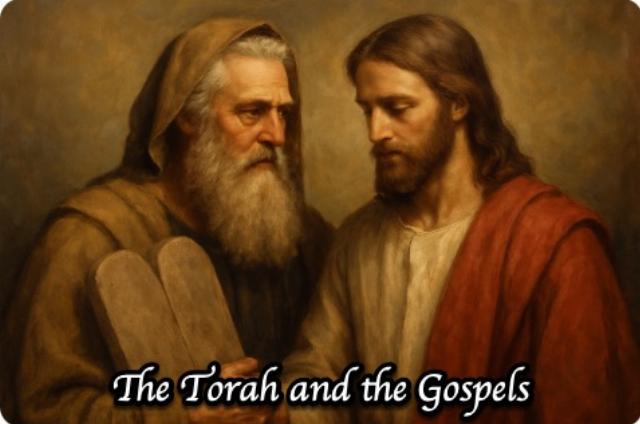Throughout history, literature has reflected both the optimistic aspirations and bleak warnings of civilization. Two of the most significant literary traditions—dystopian fiction and utopian literature—offer contrasting visions of human destiny. While utopian literature imagines idealized societies free from suffering, dystopian literature warns of oppression, technological overreach, and social decay.
Examining the trajectory of human history, dystopian literature has proven far more accurate in predicting the future than its utopian counterpart.
However, dystopian fiction often diagnoses societal flaws without offering concrete solutions.
In contrast, the Torah and the Gospels contain dystopian themes but differ fundamentally in their function. They do not merely warn about oppressive conditions but also provide moral, ethical, and social solutions—though not utopian ones.

Image created using ChatGPT.
Understanding the role of dystopian predictions and religious texts in shaping human thought allows for a better recognition of societal trends and the ability to prepare for them.
Utopian literature assumes that human nature and governance can be perfected, but history has demonstrated the flaws in such optimism. St. Thomas More’s Utopia portrays a fictional island society free from greed, inequality, and injustice, based on the belief that human beings, when placed in a rational and structured system, will act selflessly and reasonably.
However, corruption, greed, and political dysfunction prevent such utopian ideals from materializing. The modern world remains plagued by authoritarian rule and systemic injustice, contradicting the visions of utopian fiction.
Similarly, Edward Bellamy’s Looking Backward envisions a socialist utopia where economic disparity has been eliminated and class divisions abolished. Despite Bellamy’s aspirations, the 20th and 21st centuries have seen increasing wealth disparity, corporate dominance, and financial instability, exposing the impracticality of his socialist vision. (See, multi-millionaire socialist Bernie Sanders and bourgeois socialist AOC)
The fundamental flaw of utopian literature is its belief in inevitable utopia-directed progress, which ignores the human tendencies toward self-interest and dominance. While utopian fiction serves as inspiration, it has failed as a realistic predictive model of human development.
By contrast, dystopian literature has repeatedly anticipated real-world societal declines with impressive, yet alarming, precision. By extrapolating existing flaws, dystopian authors have warned of dangers that later became reality.
Orwell’s 1984 remains one of the most prescient works regarding mass surveillance and state control. Orwell envisioned a future dominated by propaganda, repression, and digital monitoring, paralleling modern surveillance networks, government oversight, and the manipulation of media narratives.
Today, digital tracking, widespread data collection, and online censorship mirror Orwell’s concept of Big Brother, where information is controlled and truth distorted. China’s Social Credit System, which monitors and ranks citizens based on behavior, embodies Orwell’s warnings of authoritarian oversight.
Similarly, Huxley’s Brave New World predicted consumer-driven control, where pleasure and entertainment pacify populations, preventing meaningful resistance or political engagement. This dystopian vision has manifested in today’s digital era, where algorithmic content and mass entertainment encourage conformity and distraction, reducing public activism.
While dystopian fiction identifies societal decay, the Torah and Gospels incorporate dystopian themes while offering structured responses to oppression. Unlike dystopian literature, which largely functions as a warning, these religious texts integrate an expectation of human morality and responsibility, which can serve as prevention or remediation.
Oppression in biblical narratives is often portrayed as the consequence of moral failure and deviation from divine justice. The Babylonian exile described in the Torah resulted from societal corruption, economic exploitation, and political complacency, much like the authoritarian collapses depicted in dystopian novels. Similarly, the apocalyptic visions in the Book of Revelation warn of oppressive rulers and suffering but frame them as the result of humanity’s rejection of righteousness rather than an inevitable outcome of political failures.
Biblical prophets serve as political analysts, identifying systemic injustice and calling for reform. Amos lived in an era of economic prosperity, yet he condemned the exploitation of the poor, dishonest trade, and complacency among the wealthy elite. His words reflect themes common in dystopian literature—systems of inequality, unchecked greed, and the suffering of the marginalized—but unlike most dystopian works, Amos prescribed moral action as the solution.
Amos urged leaders to restore fairness, uphold justice, and protect the vulnerable, demonstrating a path toward avoiding dystopian realities. In this way, the Torah and Gospels provide not just critiques of systemic oppression but also a roadmap for relief, i.e., ethical reform.
This distinction between dystopian literature and religious texts is significant. While 1984, Brave New World, and Ray Bradbury’s Fahrenheit 451 identify authoritarian control, intellectual suppression, and mass manipulation, they do not offer clear solutions beyond individual resistance.
In contrast, the Torah and Gospels contain structured moral guidance designed to counteract dystopian conditions. The Torah’s ethical mandates emphasize justice, economic fairness, and social responsibility, positioning righteousness as the safeguard against dystopian decline. Jesus, a Jew, in the Gospels furthered these ideas by promoting mercy, humility, and collective action against corruption.
Ultimately, while utopian literature fails to predict real-world events, dystopian fiction has successfully anticipated surveillance states and authoritarian rule. However, dystopian literature rarely provides solutions, instead functioning as a warning system.
In contrast, the Torah and Gospels contain dystopian themes but offer moral guidance and actionable solutions—without portraying unrealistic utopias. Biblical prophets act as political analysts, identifying oppression and prescribing justice as the path forward, bridging the gap between dystopian warnings and practical responses. By studying dystopian literature alongside religious texts, individuals can recognize emerging dangers and take ethical action to prevent dystopian futures. This interplay between prediction and prevention remains crucial in shaping the path forward.
John Adams, the second President of the United States, in a letter dated October 11, 1798, addressed to the Officers of the First Brigade of the Third Division of the Militia of Massachusetts, wrote, “Our Constitution was made only for a moral and religious people. It is wholly inadequate to the government of any other.”
So, too, is the future of a free people.
Source link

